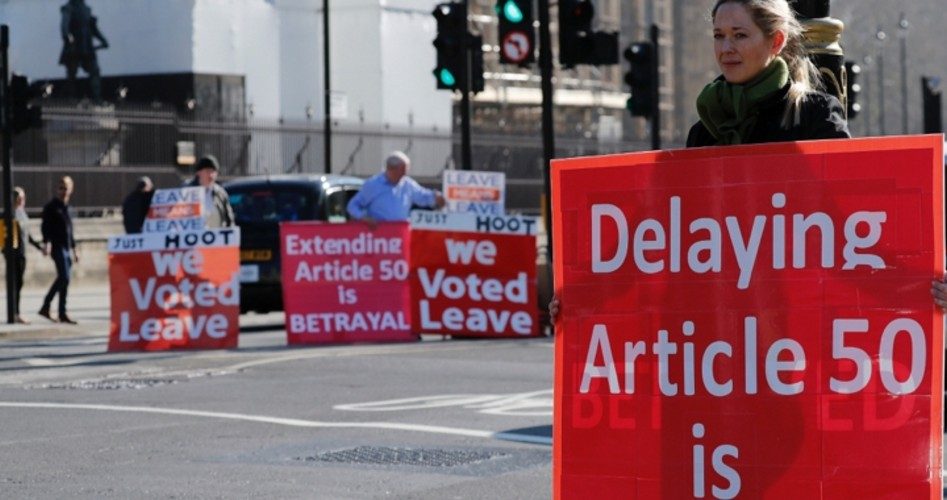
With Great Britain scheduled to leave the European Union just 31 days from now, things are happening quickly and chaotically in the British Parliament. Today, as Prime Minister Theresa May was laying out scenarios going forward, one of those scenarios would be to offer the House of Commons the option to vote on a short extension of Article 50, the provision of the European Union’s law that allows a member nation to leave unilaterally.
Amid heckling from MPs on all sides, May informed Parliament of the options:
First, we will hold a second meaningful vote [on the withdrawal deal] by Tuesday the 12th of March, at the latest. Second, if the government has not won a meaningful vote by Tuesday the 12th of March, then it will, in addition to its obligations to table a neutral amendable motion under Section 13 of the EU Withdrawal Act, table a motion to be voted on by Wednesday the 13th of March, at the latest, asking this House if it supports leaving the EU without a withdrawal agreement and a framework for a future relationship on the 29th of March. So, the United Kingdom will only leave without a deal on the 29th of March, if there is explicit consent in the House for that outcome. Third, if the House, having rejected leaving with the deal negotiated with the EU, then rejects leaving on the 29th of March without a withdrawal agreement and future framework, the government will on the 14th of March bring forward a motion on whether parliament wants to seek a short, limited extension to Article 50.
The move would appear to take a no-deal Brexit off the table, at least on March 29, since it’s highly unlikely Parliament would support such an exit. But May made clear that the no-deal option will remain on the table going forward.
“The United Kingdom will only leave without a deal on March 29 if there is explicit consent in the House for that outcome,” May said.
“An extension cannot take no-deal off the table,” May went on to say. “The only way to do that is to revoke Article 50, which I shall not do, or agree to a deal.”
According to May, any extension of Article 50 will have to be a short, one-time-only deal. Any extension beyond the end of June would necessitate that Great Britain take part in EU elections in May.
Pro-EU and Conservative MP Kenneth Clarke was dubious about May’s announcement. “She seems to be giving us a date for a new cliff-edge — the end of June.”
Staunch Brexit supporter Conservative MP Jacob Rees-Mogg expressed concern for different reasons. “If it’s being delayed … as a plot to stop Brexit altogether, then I think that would be the most grievous error that politicians could commit.”
Meanwhile, Labour Leader Jeremy Corbyn has bowed to intense pressure from his own party and is now calling for a second referendum on Brexit. Corbyn has accused May of “recklessly running down the clock” in an attempt to “force MPs to choose between her botched deal and a disastrous no-deal.”
After May’s announcement today, Corbyn said that even if May’s deal was somehow approved by Parliament, the plan should be put to the public for a “confirmatory” vote. “The prime minister’s botched deal provides no certainty or guarantees for the future,” Corby said.
The EU Parliament would have to agree unanimously to any delay, but that is not expected to be a concern.
May has been attempting to renegotiate her “soft-Brexit” plan, which was soundly rejected by Parliament by a 432-202 vote in January. However, the EU has not budged much on the key issue holding things up — the Irish Backstop.
Some in Brussels, most notably EU Council President Donald Tusk, are floating a plan that would do away with the necessity of the Backstop by delaying Brexit until 2021. That way, a new trade deal — without any hard border between Ireland and Northern Ireland — could be negotiated by the end of 2020, eliminating the need for the Backstop.
But that plan is unlikely to be approved by the House of Commons.
The entire Brexit saga is a case study on the ineffectiveness of government. Given a simple edict from its people — leave the European Union — the British Parliament, with help from the European Union, has so obfuscated the issue as to make it unrecognizable. If the British government doesn’t get Brexit done by March 29, it will have broken trust with the people of the United Kingdom, who voted unequivocally for sovereignty in 2016.
Photo: AP Images



